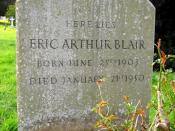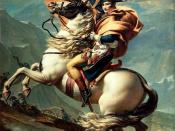Themes of power and manipulation are evident in George Orwell's allegory Animal Farm, based on the Russian revolution with animals representing the major players in the debacle, as well as Lord of the Flies, by William Golding, where young children are stranded on a tropical island without any adults or authority figure. Both show how individuals are trapped by their leaders, namely Napoleon and Jack Merridew and their respective followers, who abuse their power and manipulate others for personal gain. They demonstrate how this is an integral part of the foundations of society and are essential for them to flourish, but inevitably bring their downfall.
Animal Farm illustrates the use of power and manipulation through the characters of Napoleon, who gains much of this through the use of fear. Before Old Major's death, he preached about a land of freedom and equality for all, but the power struggle between Napoleon and Snowball leads to the corruption of the original rules.
The two fight amongst each other for power and influence, and, relating to the story of Lord of the Flies, the group is unable to decide what to do with their new found freedom, in this case, the construction of the windmill. He ousts his rival, and when the animals to not agree with him, he uses his power to win their support. He spreads rumours about Snowball, saying: Comrades, do you know who is responsible for this? Do you know the enemy who has come in the night and overthrown our windmill? SNOWBALL! Snowball has done this thing!" He uses these lies to create a strong coalition in his favour and make Snowball seem to be the enemy.
Similarly, Lord of the Flies also demonstrates the same themes. When a young boy tells rumours of a serpentine 'Beastie'...



Power and manipulation
I agree with you that power and manipulation are evident as themes in George Orwell's Animal Farm and William Golding's Lord of the Flies. You have supported your position well with pertinent examples drawn from the novels, supported by apt textual passages. Fear can indeed bring out the worst in people. Your essay was analytical and thoughtful. Good job!
7 out of 7 people found this comment useful.